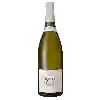
Winery Pierre Luneau-PapinFroggy Red
This wine generally goes well with beef
Food and wine pairings with Froggy Red
Pairings that work perfectly with Froggy Red
Original food and wine pairings with Froggy Red
The Froggy Red of Winery Pierre Luneau-Papin matches generally quite well with dishes of beef such as recipes of chickpeas spanish style.
Details and technical informations about Winery Pierre Luneau-Papin's Froggy Red.
Discover the grape variety: Gamay noir
Gamay is a Burgundian grape variety that has existed since the 14th century. For fear of competition with the pinot noir of Burgundy, gamay was finally uprooted and planted in the Beaujolais region, from Mâcon to Lyon. These siliceous and granitic soils suit it perfectly, and it gives its best here. But it is also planted all over France, such as in Lorraine, in the Loire Valley, in Bugey, in Savoie and in Auvergne. Gamay is early and very productive and needs to be limited so that quality prevails over quantity. Short winter pruning of the shoots and high density of vines per hectare are the methods that allow it to produce very fruity, fresh and greedy red wines. Gamay is also very popular in red wine futures, and produces wines from the Beaujolais region with very interesting character and ageing potential. The AOCs Crémant-de-Bourgogne, Mâcon, Anjou, Touraine, Rosé de vallée de la Loire, Côtes-d'Auvergne, Saint-Pourçain, Bugey, Gaillac, Côtes du Luberon... and many vins de pays are proud of it. Today, about 36,000 hectares of Gamay are cultivated in France, including 22,000 hectares in Beaujolais.
Informations about the Winery Pierre Luneau-Papin
The Winery Pierre Luneau-Papin is one of of the world's great estates. It offers 34 wines for sale in the of Val de Loire to come and discover on site or to buy online.
The wine region of Val de Loire
Val de Loire is a regional PGI title, covering wines produced in an area that roughly corresponds to the Val de Loire wine region in northern France. The PGI catchment area covers 14 departments and is one of the largest in France in terms of area. The Terroir is extremely varied throughout the Loire Valley region. Wines produced under the PGI title have as much style as the AOC appellations of the Loire.
The word of the wine: Casting
Preparatory phase of the wine-making process consisting in bursting the grapes in order to release the juice.














